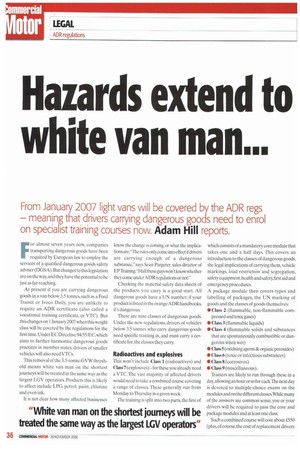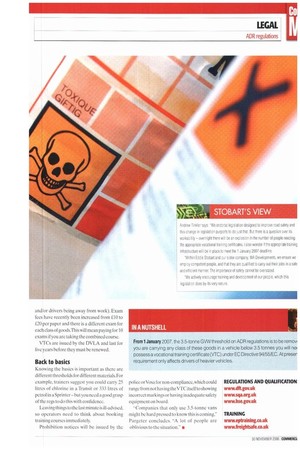Hazards extend to white van man...
Page 36

Page 37

If you've noticed an error in this article please click here to report it so we can fix it.
From January 2007 light vans will be covered by the ADR regs — meaning that drivers carrying dangerous goods need to enrol on specialist training courses now. Adam Hill reports.
For almost seven years now. companies transporting dangerous goods have been required by European law to employ the services of a qualified dangerous goods safety adviser (DGSA). But changes to this legislation are on the way, and they have the potential to be just as far-reaching.
At present if you are carrying dangerous goods in a van below 3.5 1onnes,such as a Ford Transit or Iveco Daily, you are unlikely to require an ADR certificate (also called a vocational training certificate. or VTC). But this changes on 1 January 2007 when this weight class will be covered by the regulations for the first time. Under EC Directive 94/55/EC,which aims to further harmonise dangerous goods practices in member states, drivers of smaller vehicles will also need VTCs.
This removal of the 3.5-tonne GVW threshold means white van man on the shortest journeys will be treated in the same way as the largest LGV operators. Products this is likely to affect include LPG, petrol, paint, chlorine and even ink.
It is not clear how many affected businesses know the change is coming, or what the implications are."The rules only come into effect if drivers are carrying enough of a dangerous substance," says Sean Pargeter, sales director of EP Training.-Half theseguys won't know whether they come under ADR regulations or not.
Checking the material safety data sheets of the products you carry is a good start. All dangerous goods have a UN number; if your product is listed in the orange ADR handbooks, it's dangerous.
There are nine classes of dangerous goods. Under the new regulations. drivers of vehicles below 3.5 tonnes who carry dangerous goods need specific training in, and must carry a certificate for, the classes they carry.
Radioactives and explosives
This won't include Class 1 (radioactives) and Class 7 (explosives) for these you already need a VTC. The vast majority of affected drivers would need to take a combined course covering a range of classes. These generally run from Monday toThursday in a given week.
The training is split into two parts. the first of which consists of a mandatory core module that takes one and a half days. This covers an introduction to the classes of dangerous goods, the legal implications of carrying them, vehicle markings. load restriction and segregation. safety equipment, health and safety,first aid and emergency procedures.
A package module then covers types and labelling of packages, the UN marking of goods and the classes of goods themselves: • Class 2 (flammable, non-flammable compressed and toxic gases) • Class 3 (flammable liquids) • Class 4 (flammable solids and substances that are spontaneously combustible or dangerous when wet) • Class 5 (oxidising agents & organic peroxides) • Class 6 (toxic or infectious substances) • Class 8 (corrosives) • Class 9 (miscellaneous).
Trainers are likely to run through these in a day, allowing an hour or so for each.The next day is devoted to multiple-choice exams on the modules and on the different classes.While many of the answers are common sense, you or your drivers will he required to pass the core and package modules and at least one class.
Such a combined course will cost about £550 (plus, of course, the cost of replacement drivers and/or drivers being away from work). Exam fees have recently been increased from £10 to £20 per paper and there is a different exam for each class of goods.This will mean paying for 10 exams if you are taking the combined course.
VTCs are issued by the DVLA and last for five years before they must be renewed.
Back to basics
Knowing the basics is important as there are different thresholds for different materials. For example, trainers suggest you could carry 25 litres of chlorine in a Transit or 333 litres of petrol in a Sprinter— but you need a good grasp of the regs to do this with confidence.
Leaving things to the last minute is ill-advised. SO operators need to think about hooking training courses immediately.
Prohibition notices will be issued by the police orVosa for non-compliance, which could range from not having the VTC itself to showing incorrect markings or having inadequate safety equipment on board.
"Companies that only use 3.5-tonne vans might be hard pressed to know this is coming," Pa rge ter concludes. "A lot of people are oblivious to the situation." m
STOBART'S VIEW
Andrew Tinkler says: 'We endorse legislation designed to improve road safety and this change in legislation purports to do just that. But there is a guestion over its workability — overnight there will be an explosion in the number of people needing the appropriate vocational training certilicates. I also wonder if the appropriate training infrastructure will be in place to meet the 1 January 2007 deadline.
'Within Eddie Stobart and our sIster company, WA Developments, we ensure we employ competent people, and that they are qualified to carry out their jobs in a safe and efficient manner. The importance of safety cannot be overstated.
"We actively encourage training and development of our people, which this legislation does by its very nature.
IN A NUTSHELL
From 1 January 2007, the 3,5-tonne GVW threshold on ADR regulations is to be removi you are carrying any class of these goods in a vehicle below 3.5 tonnes you will neE possess a vocational training certificate (VIC) under EC Directive 94/55/EC. At preser requirement only affects drivers of heavier vehicles.
REGULATIONS AND QUALIFICATION www.dflgov.uk www.sqa.org.uk www.hse.gov.uk TRAINING www.eptraining.co.uk www.freightsafe.co.uk


















































































































































































